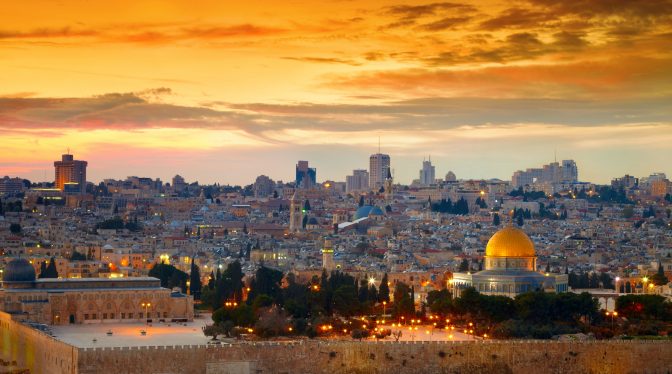Israel: The Land of Medical Marijuana

Israel leads the world in cannabis research, but it‘s not quite ready for legalization.
In August, just a few weeks after the expansion of Israel’s medical marijuana program was announced, Agriculture Minister Uri Ariel declared that Israel would soon begin exporting cannabis. “The Agriculture Ministry has set up specific areas for the research and trial of growing cannabis, a plant whose foremost use is the medical treatment of patients around the world,” he stated.
Israeli cannabis activists welcomed Ariel’s announcement. “The export option has been denied a number of times by the authorities,” says Green Leaf Party founder Boaz Wachtel. “Here we have one minister who makes a supportive statement—which is progress—but the final decision is at the hand of the full Cabinet. And there are some ministers, such as the Minister of Interior Affairs, who oppose this move.”
Wachtel speculates that exporting medical cannabis might help growers become more professional, and reduce the price of pot for patients in Israel, which is already a premier exporter of other products, such as Jaffa oranges, dates and flowers. David Schacter, CEO of CannabiScope, a company that classifies different strains, thinks it would make sense for Israel to export cannabis: “The idea of ‘making the desert bloom’ is deeply ingrained in the Israeli mentality. The weather in these northern countries [in Europe] is also a factor limiting growth and cultivation. Exporting [cannabis] may well be a win-win situation. Thus, Israeli companies have the chance to be ‘first to market’ in meeting European needs and providing superior products.”
Although it’s been the target of criticism at home, Israel’s medical marijuana program is a shining example of global cannabis progress. Israeli growers can access government programs in order to facilitate research that helps them coordinate breeding technology with the corresponding medical ailments they’re trying to target. And advanced Israeli greenhouse technology has helped cultivators like Yohai Golan-Gild, founder of medical cannabis company Better, grow on an industrial level and stabilize his crop for medical consistency.
Golan-Gild spent several years learning about cannabis cultivation in California’s Emerald Triangle. He brought California strains back home and perfected them with Israeli methods, taking advantage of the clinical trials he can do in university research facilities. While imperfect, Israel’s medical marijuana program offers a good example of legal coordination among the government, academia, the medical community and growers.
The Expansion of Medical Marijuana
Israel is home to globally renowned medical marijuana companies like Better and Tikun Olam, as well as Professor Raphael Mechoulam, the chemist who discovered THC and continues to make advances in the field. Israeli researchers are constantly investigating cannabis for a variety of ailments—everything from cancer and epilepsy to osteoporosis and autism. Dr. Adi Eran, head of the pediatric neurology department at Shaare Zedek Medical Center, in Jerusalem, will soon begin the first-ever clinical trials to test cannabis as a treatment for autistic adults and children.
 Yet, while Israel can boast of its sophisticated research program, its medical marijuana policy has only recently expanded, having been limited to a small number of patients for several years since it began in 2007. Now, it’s integrated into Israel’s national healthcare system and regulated by the Ministry of Health. More than 23,000 patients have government-issued licenses to use medical cannabis; patients qualify only after a difficult process of proving that other pharmaceutical drugs have failed to effectively treat them. That’s about .3% of Israel’s 8 million residents, as compared to the 760,000 California medical marijuana patients who comprise just under 2% of the state’s population of 39 million residents.
Yet, while Israel can boast of its sophisticated research program, its medical marijuana policy has only recently expanded, having been limited to a small number of patients for several years since it began in 2007. Now, it’s integrated into Israel’s national healthcare system and regulated by the Ministry of Health. More than 23,000 patients have government-issued licenses to use medical cannabis; patients qualify only after a difficult process of proving that other pharmaceutical drugs have failed to effectively treat them. That’s about .3% of Israel’s 8 million residents, as compared to the 760,000 California medical marijuana patients who comprise just under 2% of the state’s population of 39 million residents.
Israeli patients are allowed to participate in clinical trials, where they consume cannabis under supervision at hospitals and other treatment centers. Unlike American medical marijuana programs, which vary from state to state, Israel’s program is completely centralized (it helps that the country is only about the size of New Jersey) and completely legal. Even Israeli prison inmates who qualify as patients are allowed to use medical marijuana.
Under Israel’s current program, eight companies can grow and provide medicine to registered patients, who are required to sign up with a particular company, and can only purchase products from that company. Medical cannabis was initially only available from one hospital in the entire country, but new regulations are making it more widely available from a number of pharmacies, and individual growers may soon be able to sign up with the program.
A patient’s medical plan determines the fixed price of the cannabis he or she receives. This turns out to be economically beneficial for the patient, but may be a financial burden to the growing companies. A month’s supply of cannabis—be it 20 grams, 100 grams or whatever the patient needs—costs 380 shekels, or about $100. (Meanwhile a gram of pot on the Israeli black market costs about 100 shekels, or $25.) Patients are essentially paying for the service, rather than the grams, says Sylvia Sheinbaum, a Tel Aviv-based cannabis activist.
“Patients want an easy way to receive their medicine without the hassle of the Ministry of Health,” she tells Freedom Leaf. “Today there are so many problems still in receiving the medicine and getting the right dosages, as well as the right types, and so on. I think it will take time for things to move forward.”
The new regulations seek to expand the program. The Health Ministry will train and authorize 100 more doctors to prescribe cannabis to patients; currently only 36 are authorized, half of whom are part of the Health Ministry’s medical cannabis unit. The training is set to begin this winter.
The Failure to Legalize
While Israel may be far ahead of the U.S. regarding medical marijuana research, activists there complain about what they call a “greenwashing” effect in which Israel boasts of a cannabis program that actually leaves many dissatisfied.
“There have been so many ‘new regulations’ that I can’t keep track of what’s new and what’s old,” Iair Raviv, head of Canna, an Israeli news site, posted in July. “Israel likes to brag about the cannabis industry, the research and the products that are manufactured here. However, it opens 25,000 cannabis files a year and makes the life of whoever wants a cannabis prescription miserable, and when one finally gets a ‘license to obtain dangerous material,’ it will be in low dosage and quality.”
Activists like Raviv want to go beyond the medical use of cannabis, and are pushing for decriminalization, or even legalization. “You can’t have good research under prohibition,” he adds. “Research needs freedom in order to thrive.”
In terms of recreational use, the laws have not changed, but enforcement is lax, Sheinbaum explains. She’s hopeful that the end of prohibition is on the horizon for Israel. While cannabis may seem virtually decriminalized in places like Tel Aviv, where the smell of pot is as commonplace as it is on the streets of Brooklyn, marijuana offenders can still end up behind bars, even if only for a short period.
In April, Haaretz reported that 20 people per day are arrested in Israel for soft drugs like cannabis. The country sees more than 20,000 new drug-related cases every year, the majority of which are for personal use. Following public outrage, Yohanan Danino, former chief of the Israeli Police, declared in May 2015, “It’s high time that the police and state examine the traditional approach to cannabis.” He later formed a committee to look into Israel’s medical marijuana and adult-use laws. But Israel has done little to reform legislation for the latter.
“Despite the huge changes in global trends and updated approaches that were presented at the U.N. [during the United Nations General Assembly Special Session on Drugs in April], to my regret Israel’s position with regard to decriminalization is conservative, stereotypical and entrenched,” Tamar Zandberg, a member of the Meretz political party in the Knesset (Israeli parliament), told Haaretz. “The Western world already knows that criminalization is part of the problem, not the solution. Countries that still believe in stiff penalties and criminalization are countries like Russia, Sudan and Afghanistan…. In many countries, there is a declared or de facto decriminalization, and Israel too should move in that direction.”
In June, Yinon Magal, a first-term Knesset member of the Jewish Home party, sponsored legislation to decriminalize cannabis for adult use. His proposal would allow people to possess small amounts in their homes. Drug dealing would still be illegal. As similar bills in the past have failed, decriminalization has been a tough issue to get through the Knesset.
“This is, first and foremost, a social proposal meant for youngsters from lower socioeconomic backgrounds [who] were arrested for a grain of cannabis, spent a night in jail with crooks and may fall into the world of crime,” observed Magal, who has admitted to smoking pot. Currently, non-medical pot use is punishable by a fine and up to three years’ imprisonment for simple possession. However, due to “lack of public interest,” many small possession cases are not even prosecuted. “For personal use and growing, it’s mostly just a record and community service,” Raviv points out. “Even commercial growers get one to two years, max. Judges are fed up with seeing cannabis offenders in court, but, in spite of that, the police over-enforce cannabis crimes.”
A Personal Note
Having lived in Israel, I’ve found that the Israeli public has mixed attitudes about cannabis. In Tel Aviv, it’s fairly normalized, though most people smoke spliffs with tobacco, instead of pure joints, because of pot’s high price and sometimes limited availability. Nearly 90% of the 20,000 young Israelis who travel to India each year after their obligatory service in the Army use cannabis. However, among the country’s more conservative residents, it still carries a stigma.
Yet, even among Israel’s ultra-Orthodox Jewish community, cannabis is somewhat accepted. While the general idea is to get high on God, rather than on any substance, cannabis use, especially for medical purposes, can technically be deemed kosher. Meanwhile, the humorous phrase “POT: Put on Tefillin” (items worn by the most religious Jews) has circulated among observant communities. During my most recent trip to Israel this past June, I visited Yohai Golan-Gild’s medical cannabis farm. As a Southern California native, it felt almost like home: the desert in bloom, and cannabis plants thriving in greenhouses, with each facility meticulously organized according to the strains and growing conditions that Golan-Gild was maintaining. The collaboration between Israeli growers and the government—coupled with Golan-Gild’s experience integrating Californian and Israeli methods—is encouraging, and shows how much progress can be made through cooperation and shared knowledge.
If you enjoyed this Freedom Leaf article, subscribe to the magazine today!

